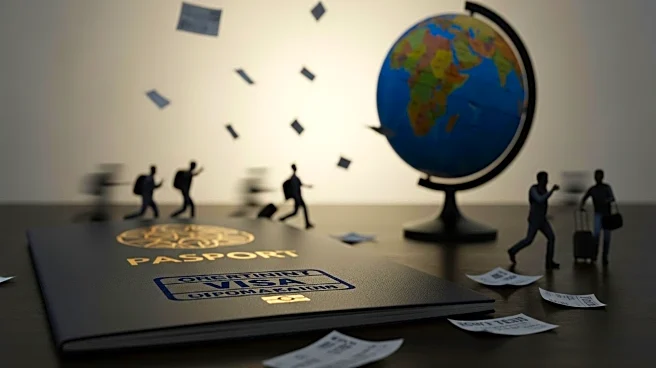What is the story about?
What's Happening?
President Trump has signed a proclamation imposing a $100,000 fee on H-1B visa petitions, leading to widespread panic among Indian travelers in the United States. The fee represents a significant increase from the current cost of filing an H-1B petition, which ranges between $2,000 and $5,000. This sudden change has caused chaos at airports, particularly at San Francisco International Airport, where several Indian passengers disembarked from an Emirates flight fearing they might not be able to return to the U.S. if they left. The flight was delayed for over three hours as ground staff managed the situation. Viral videos on social media platforms like X and Instagram show passengers in panic, although these have not been independently verified. Major U.S. firms such as Microsoft, Amazon, and JP Morgan have advised their employees on H-1B visas to return to the U.S. before September 21 or avoid international travel to prevent visa complications.
Why It's Important?
The imposition of a $100,000 fee on H-1B visa applications is likely to have significant implications for the U.S. tech industry, which heavily relies on skilled foreign workers, particularly from India. The H-1B visa program is crucial for companies that need specialized talent, and this fee increase could deter many from applying, potentially leading to a shortage of skilled workers. This move may also strain U.S.-India relations, as the Indian diaspora is a significant contributor to the U.S. economy. Companies that depend on H-1B visa holders may face operational challenges, and the policy could lead to increased costs for businesses that need to sponsor these visas.
What's Next?
The new fee structure is expected to prompt reactions from various stakeholders, including tech companies, foreign governments, and advocacy groups. Companies may lobby for policy changes or seek legal avenues to challenge the fee increase. The Indian government might engage in diplomatic discussions to address the concerns of its citizens affected by this policy. Additionally, there could be increased scrutiny and debate over the U.S. immigration policies and their impact on international relations and the economy.
Beyond the Headlines
The fee increase raises ethical and legal questions about the accessibility and fairness of the U.S. immigration system. It may lead to discussions about the balance between national security and economic growth, as well as the role of immigration in fostering innovation and diversity in the workforce. Long-term, this policy could shift the dynamics of global talent migration, with skilled workers seeking opportunities in countries with more favorable immigration policies.















